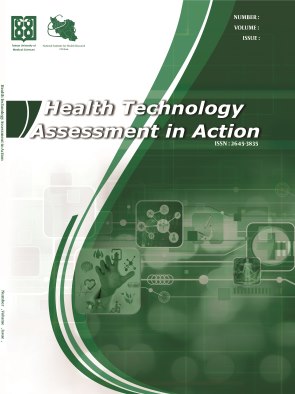The Role of Culture in Auditors’ Social Norms and Audit Quality in Iran’s Environmental Conditions
Abstract
Background: The quality of auditing and how it is performed has always been the subject of audit research. Quality of audit is important because of the increased reliability of the financial results. The quality of auditing is remarkable because it can have a tremendous impact on the decisions of investors, employees, employees, and employees.
Objectives: The purpose of this study is to investigate the role of culture in auditors’ social norms and audit quality in Iran’s environmental conditions.
Methods: The research method was descriptive and structural equations. The statistical population of this study consisted of all auditors working in member firms of auditors in Iran. According to the unlimited statistical population, with the help of Cochran’s formula, a sample size of 384 was obtained, and finally, by sampling in a questionnaire, 380 were collected. The research tools included innovative questionnaires for activating social norms, audit quality, and auditor culture. Analytical analysis methods were used for the data.
Results: The fit indices of the research model were in good condition. Activation of social norms (ethical reasoning, responsibility, honesty, and fairness) significantly affected audit quality. The mediating role of culture in auditors’ social norms and audit quality has also been investigated. Among the hypotheses of mediator sub-relationships, the mediating role of ethical culture (ethics at work) in the relationship
between (activating the auditor’s ethical reasoning and audit quality) and the mediating role of Islamic culture in the relationship between (auditor’s sensitivity in accountability and audit quality) became.
Conclusions: The activation of social norms significantly affected audit quality. The auditor culture had a significant effect on the relationship between the activation of social norms and audit quality.
1. Nikbakht M, Mahmoodi Khoshrou O. Investigating the Factors Affecting Audit Quality in Iran According to the Indicators of Public Accounting Supervision Board (PCAOB). Accounting and auditing reviews. 2017;24(3):441-62.
2. Khodaei Esameilkandi P, Amini P, Mohammadi Melgharni A, Fatemy A. Application of decision tree algorithms in predicting audit quality. Management accounting and auditing knowledge. 2019;8(32):209-24.
3. Xiao T, Geng C, Yuan C. How audit effort affects audit quality: An audit process and audit output perspective. China Journal of Accounting Research. 2020;13(1):109-27.
4. Hope O-K, Hu D, Zhao W. Third-party consequences of short-selling threats: The case of auditor behavior. Journal of Accounting and Economics. 2017;63(2-3):479-98.
5. The effect of genuine leadership and ethical culture of the firm on the auditor's behavior. Razi University: Razi University 2017.
6. Blay AD, Gooden ES, Mellon MJ, Stevens DE. Can social norm activation improve audit quality? Evidence from an experimental audit market. Journal of Business Ethics. 2019;156(2):513-30.
7. Douglas PC, Davidson RA, Schwartz BN. The effect of organizational culture and ethical orientation on accountants' ethical judgments. Journal of Business Ethics. 2001;34(2):101-21.
8. Kertarajasa AY, Marwa T, Wahyudi T. The effect of competence, experience, independence, due professional care, and auditor integrity on audit quality with auditor ethics as moderating variable. 2019.
9. Sweeney B, Pierce B, Arnold Sr DF. The impact of perceived ethical intensity on audit-quality-threatening behaviours. Accounting and Business Research. 2013;43(2):112-37.
10. Haeridistia N, Fadjarenie A. The effect of independence, professional ethics & auditor experience on audit quality. International Journal of Scientific & Technology Research. 2019;8(2):24-7.
11. Agus A, Ghozali I. Mediating effect of audit quality in relationship between auditor ethics and litigation: an empirical study. 2019.
12. Arens AA, Elder RK, Beasley MS, Jusuf AA. Auditing and Assurance Services an Integrated Approach: An Indonesian Adaptation. 2009.
13. Berglund N, Kang T. Does social trust matter in financial reporting? Evidence from audit pricing. Journal of Accounting Research. 2013;12:119-21.
14. Davidson BI. The effects of reciprocity, self-awareness, and individual characteristics on honesty in managerial reporting: The Florida State University; 2010.
15. Abdelhak EE, Elamer AA, AlHares A, McLaughlin C. Auditors’ ethical reasoning in developing countries: The case of Egypt. International Journal of Ethics and Systems. 2019.
16. Kaplan SE, Pope KR, Samuels JA. The effect of social confrontation on individuals’ intentions to internally report fraud. Behavioral Research in Accounting. 2010;22(2):51-67.
17. Zahmatkesh S, Rezazadeh J. The effect of auditor features on audit quality. Tékhne. 2017;15(2):79-87.
18. Nasrabadi A, Arbabian A. The effects of professional ethics and commitment on audit quality. Management Science Letters. 2015;5(11):1023-8.
19. Gaynor LM, Kelton AS, Mercer M, Yohn TL. Understanding the relation between financial reporting quality and audit quality. Auditing: A Journal of Practice & Theory. 2016;35(4):1-22.
20. Grabner I, Vienna W, Haesebrouck K. Literature Review The Effect of Audit Culture on Audit Quality. 2019.
21. Jenkins JG, Deis DR, Bedard JC, Curtis MB. Accounting firm culture and governance: A research synthesis. Behavioral Research in Accounting. 2008;20(1):45-74.
22. Knechel WR, Krishnan GV, Pevzner M, Shefchik LB, Velury UK. Audit quality: Insights from the academic literature. Auditing: A Journal of Practice & Theory. 2013;32(Supplement 1):385-421.
23. Suddaby R, Gendron Y, Lam H. The organizational context of professionalism in accounting. Accounting, organizations and society. 2009;34(3-4):409-27.
| Files | ||
| Issue | Vol 6, No 1 (2022) | |
| Section | Articles | |
| DOI | https://doi.org/10.18502/htaa.v6i1.11134 | |
| Keywords | ||
| Audit quality; Culture; Social norms; Accounting; Iran | ||
| Rights and permissions | |

|
This work is licensed under a Creative Commons Attribution-NonCommercial 4.0 International License. |




